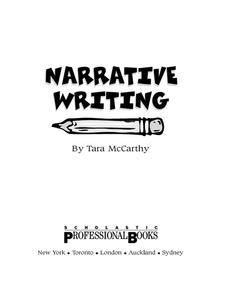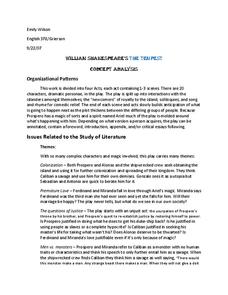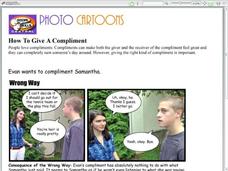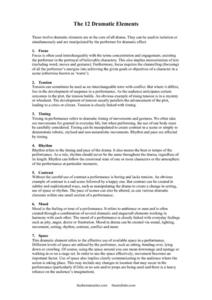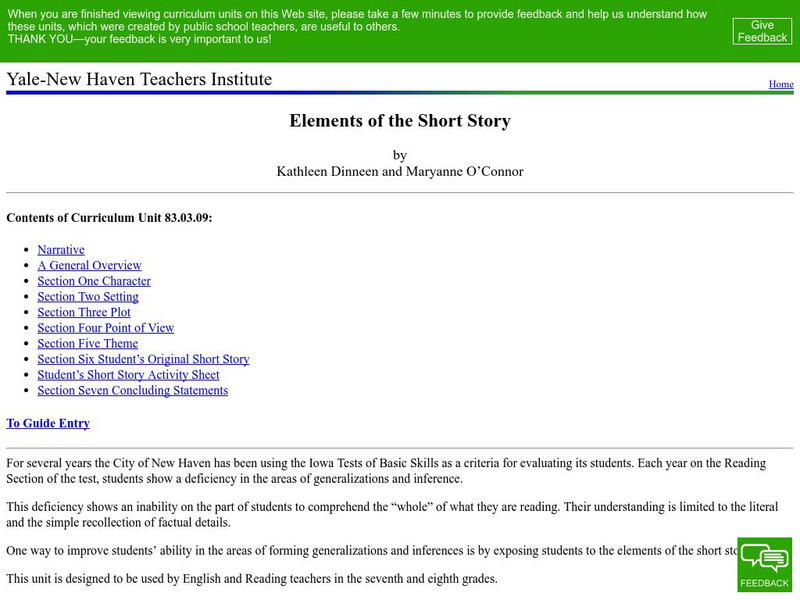Scholastic
Narrative Writing
If you're looking to start a unit based around narrative writing, make sure to consider this resource while you're planning. This book covers five topics: writing personal narratives, writing narratives about others, writing...
Novelinks
The View From Saturday: Concept/Vocabulary Analysis
Design your unit on The View From Saturday by E.L. Konigsburg with a concept and vocabulary analysis resource. It outlines the plot, literary elements, vocabulary issues, and any possible considerations for planning a differentiated...
Novelinks
The Tempest: Concept Analysis
Use a handy concept analysis guide as you begin your unit on William Shakespeare's The Tempest. With character descriptions, literary themes, and anticipated affective issues, the guide can help those new to using The Tempest craft...
Social Skills Central
Photo Cartoons: How To Give A Compliment
Help learners develop the ability to offer appropriate, meaningful compliments to others—an essential social skill. Here you'll find a quick photo cartoon illustrating a right and wrong way to give a compliment, as well as a brief...
Curated OER
A P Literary Terms
Is a list of literary terms found frequently on AP English exams of value to test takers? Now there's a rhetorical question. Here's a list that provides definitions for everything from allegory to vernacular. To say the list is...
Library of Congress
Determining Point of View: Paul Revere and the Boston Massacre
If you're teaching point of view, this is the lesson for you! First, decipher the writer's point of view from a primary resource, then compare and contrast the primary source with a secondary source to explore the Paul Revere's...
MENSA Education & Research Foundation
Magical Musical Tour: Using Lyrics to Teach Literary Elements
Language arts learners don't need a lecture about poetry; they listen to poetry every day on the radio! Apply skills from literary analysis to famous songs and beautiful lyrics with a lesson about literary devices. As...
Shoop English
Literature Terms Activity
Designed to be used with an independent reading book, this activity provides practice with identifying and explaining literary terms. While they read, individuals find instances of literary devices and elements in use in their books....
NPR
Theatre Vocabulary
From actor to volume, the 90 terms on a theatre vocabulary list are must knows for any student of the dramatic arts.
Houghton Mifflin Harcourt
Core Analysis Frame: Fiction
Dig into any piece of fiction with a series of analysis questions. There are two levels of questions provided: basic and in-depth. The basic questions can be copied double-sided onto a single piece of paper, while the in-depth questions...
Ohio Department of Education
A Glossary of Literary Terms
If you're tired of defining allusion, onomatopoeia, and satire for your language arts students, hand out a complete list of literary devices to keep the terms straight. Each term includes a definition that is easy to understand and...
Drama Teacher
The 12 Dramatic Elements
Plays are meant to be seen and so are these 12 elements that give plays the dramatic effect. Introduce young actors to these key terms and their explanations
Maryland Department of Education
The Concept of Diversity in World Literature Lesson 12: Author's Purpose - Yeats and Achebe
Is there such a thing as fate/luck? Can one fight destiny? As part of their study of Chinua Achebe's purpose in writing Things Fall Apart, class members answer these questions from Achebe's point of view and then from William...
It's About Time
Taking a Ride on a Lithospheric Plate
Assist your pupils and broaden their horizons with several activities that determine the exact positioning of various communities over the globe. Pupils use data from the Global Positioning System to determine the position and rate of...
ProCon
President Ronald Reagan
At 69 years old, Ronald Reagan was the oldest man ever to be elected president in the United States. After reviewing a thorough history of Reagan's presidency, pupils read the main pro and con arguments to determine if he was a good...
IPDAE
Themes in Short Stories
"What is the theme of this story?" The very question can spark fear in the minds of readers and incinerate confidence. Here you will discover an exercise that shows how writers use the tools of setting, plot, conflict, and...
Virginia Tech
The Psychological Changes of Adolescence: A Test of Character
Discusses the crises of adolescence, using Erikson and Kohlberg, and then discusses those ideas as reflected in the writing of Cormier. Cormier.
Sonoma State University
Sonoma State University: Soren Kierkegaard: Summary of Important Ideas
An excellent place to start learning the terminology and ideas of Kierkegaard. The explanations are clear and easy to understand.
City University of New York
Cuny Brooklyn: Literary Terms
Site gives definitions of many literary terms including "characterization."
Ted Nellen
Cyber English (By Ted Nellen): Characterization
This is a glossary entry for the term "Characterization" including a definition and the characteristics to be developed: Character's appearance, actions, thoughts, voice, and reaction from others.
Yale University
Yale University: Elements of the Short Story
This unit from the Yale University on elements of the short story is designed to develop student comprehension skills, particularly making inferences and generalizing. It also involves students in reading a number of short stories to...
SparkNotes
Spark Notes: Wuthering Heights by Emily Bronte
Read a Plot Overview of the entire book of Wuthering Heights by Emily Bronte or a chapter by chapter Summary and Analysis. Also provided are links to character lists, main ideas, quotes, and writing help.
PBS
Pbs: The West: Frederick Jackson Turner (1861 1932)
This PBS website provides a brief biographical sketch of Frederick Jackson Turner, and an overview of his theory regarding the significance of the American western frontier as the defining experience in the development of the American...
Caro Clarke
Caroclarke: Dialogue: The Best Action
This is the fourteenth article in a series published with the goal of helping the new novel author. This article focuses on using dialogue to advance the action of the story. Links on the left offer other information about story writing.
Other popular searches
- Drama Character Development
- Poetry Character Development
- Story Character Development
- Moral Character Development
- Literary Character Development
